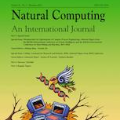Recent comprehensive overview of 40 years of research in cognitive architectures, (Kotseruba and Tsotsos 2020), evaluates modelling of the core cognitive abilities in humans, but only marginally addresses biologically plausible approaches based on natural computation. This mini review presents a set of perspectives and approaches which have shaped the development of biologically inspired computational models in the recent past that can lead to the development of biologically more realistic cognitive architectures. For describing continuum of natural cognitive architectures, from basal cellular to human-level cognition, we use evolutionary info-computational framework, where natural/ physical/ morphological computation leads to evolution of increasingly complex cognitive systems. Forty years ago, when the first cognitive architectures have been proposed, understanding of cognition, embodiment and evolution was different. So was the state of the art of information physics, bioinformatics, information chemistry, computational neuroscience, complexity theory, self-organization, theory of evolution, information and computation. Novel developments support a constructive interdisciplinary framework for cognitive architectures in the context of computing nature, where interactions between constituents at different levels of organization lead to complexification of agency and increased cognitive capacities. We identify several important research questions for further investigation that can increase understanding of cognition in nature and inspire new developments of cognitive technologies. Recently, basal cell cognition attracted a lot of interest for its possible applications in medicine, new computing technologies, as well as micro- and nanorobotics.
翻译:最近对40年的认知架构(Kotseruba和Tsotsos 2020年)的研究进行了40年的全面审查,评估了人类核心认知能力的建模,但仅略微涉及基于自然计算的生物合理方法。这一小型审查展示了一套观点和办法,这些观点和办法塑造了最近过去生物启发的计算模型的发展,这些模型可以导致生物上更现实的认知架构的发展。为了描述从巴萨细胞到人类层面的认知结构的连续自然认知结构,我们使用了进化信息合成框架,在这个框架中,自然/物理/形态计算导致日益复杂的认知系统的演化。四十年前,当首次提出认知结构时,对认知、变异和演化的理解是不同的。信息物理学、生物信息学、信息化学、计算神经科学、复杂理论、自我组织、进化理论、信息和计算学的连续过程,我们利用进化信息-进化-进化-进化-进化-进化-进化-进化-进化-进化-进化-进化-进化-进化-进化-进化-进化-进化-进化-进化-进化-进化-进化-进-进-进-进-进-进-进-进-进-进-进-进-进-进-进-进-进-进-进-进-进-进-进-进-进-进-进-进-进-进-进-进-进-进-进-进-进-进-进-进-进-进-进-进-进-进-进-进-进-进-进-进-进-进-进-进-进-进------进-进---进-进---------------------------------------------------------------------------------------------------------------------------





